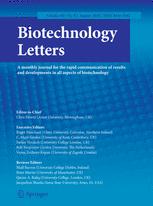Ver ítem
- xmlui.general.dspace_homeCentros e Institutos de InvestigaciónCICVyA. Centro de Investigación en Ciencias Veterinarias y AgronómicasInstituto de GenéticaArtículos científicosxmlui.ArtifactBrowser.ItemViewer.trail
- Inicio
- Centros e Institutos de Investigación
- CICVyA. Centro de Investigación en Ciencias Veterinarias y Agronómicas
- Instituto de Genética
- Artículos científicos
- Ver ítem
Plant growth-promoting bacterium Pseudomonas fluorescens FR1 secrets a novel type of extracellular polyhydroxybutyrate polymerase involved in abiotic stress response in plants
Resumen
Objectives Identification of novel microbial factors
contributing to plant protection against abiotic stress.
Results The genome of plant growth-promoting
bacterium Pseudomonas fluorescens FR1 contains a
short mobile element encoding a novel type of
extracellular polyhydroxybutyrate (PHB) polymerase
(PhbC) associated with a type I secretion system.
Genetic analysis using a phbC mutant strain and plants
showed that this novel extracellular enzyme
[ver mas...]
Objectives Identification of novel microbial factors
contributing to plant protection against abiotic stress.
Results The genome of plant growth-promoting
bacterium Pseudomonas fluorescens FR1 contains a
short mobile element encoding a novel type of
extracellular polyhydroxybutyrate (PHB) polymerase
(PhbC) associated with a type I secretion system.
Genetic analysis using a phbC mutant strain and plants
showed that this novel extracellular enzyme is related
to the PHB production in planta and suggests that PHB
could be a beneficial microbial compound synthesized
during plant adaptation to cold stress.
Conclusion Extracellular PhbC can be used as a new
tool for improve crop production under abiotic stress.
[Cerrar]

Autor
Stritzler, Margarita;
Diez Tissera, Ana;
Soto, Gabriela;
Ayub, Nicolás Daniel;
Fuente
Biotechnology letters 40 (9–10) : 1419–1423 (October 2018)
Fecha
2018
Editorial
Springer
ISSN
0141-5492
1573-6776 (Online)
1573-6776 (Online)
Formato
pdf
Tipo de documento
artículo
Palabras Claves
Derechos de acceso
Restringido
 Excepto donde se diga explicitamente, este item se publica bajo la siguiente descripción: Creative Commons Attribution-NonCommercial-ShareAlike 2.5 Unported (CC BY-NC-SA 2.5)
Excepto donde se diga explicitamente, este item se publica bajo la siguiente descripción: Creative Commons Attribution-NonCommercial-ShareAlike 2.5 Unported (CC BY-NC-SA 2.5)

